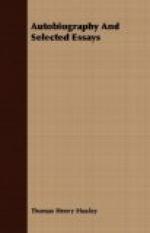Our forefathers had their own ways of accounting for each of these calamities. They submitted to the plague in humility and in penitence, for they believed it to be the judgment of God. But, towards the fire they were furiously indignant, interpreting it as the effect of the malice of man,—as the work of the Republicans, or of the Papists, according as their prepossessions ran in favour of loyalty or of Puritanism.
It would, I fancy, have fared but ill with one who, standing where I now stand, in what was then a thickly peopled and fashionable part of London, should have broached to our ancestors the doctrine which I now propound to you—that all their hypotheses were alike wrong; that the plague was no more, in their sense, Divine judgment, than the fire was the work of any political, or of any religious sect; but that they were themselves the authors of both plague and fire, and that they must look to themselves to prevent the recurrence of calamities, to all appearance so peculiarly beyond the reach of human control—so evidently the result of the wrath of God, or of the craft and subtlety of an enemy.
And one may picture to one’s self how harmoniously the holy cursing of the Puritan of that day would have chimed in with the unholy cursing and the crackling wit of the Rochesters and Sedleys,[22] and with the revilings of the political fanatics, if my imaginary plain dealer had gone on to say that, if the return of such misfortunes were ever rendered impossible, it would not be in virtue of the victory of the faith of Laud,[23] or of that of Milton; and, as little, by the triumph of republicanism, as by that of monarchy. But that the one thing needful for compassing this end was, that the people of England should second the efforts of an insignificant corporation, the establishment of which, a few years before the epoch of the great plague and the great fire, had been as little noticed, as they were conspicuous.
Some twenty years before the outbreak of the plague a few calm and thoughtful students banded themselves together for the purpose, as they phrased it, of “improving natural knowledge.” The ends they proposed to attain cannot be stated more clearly than in the words of one of the founders of the organisation:—
“Our business was (precluding matters of theology and state affairs) to discourse and consider of philosophical enquiries, and such as related thereunto:—as Physick, Anatomy, Geometry, Astronomy, Navigation, Staticks, Magneticks, Chymicks, Mechanicks, and Natural Experiments; with the state of these studies and their cultivation at home and abroad. We then discoursed of the circulation of the blood, the valves in the veins, the venae lacteae, the lymphatic vessels, the Copernican hypothesis, the nature of comets and new stars, the satellites of Jupiter, the oval shape (as it then appeared) of Saturn, the spots on the sun and its turning on its own axis, the inequalities and




